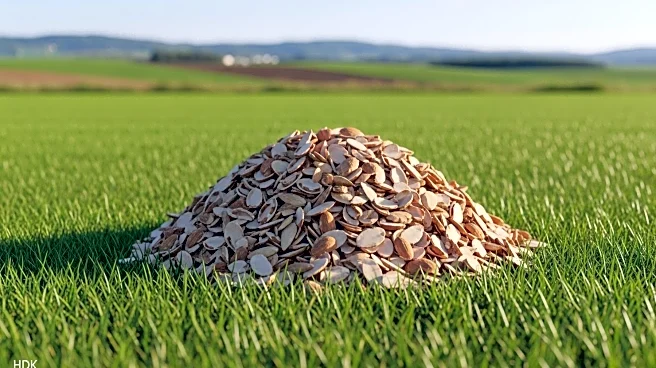What is the story about?
What's Happening?
Nitricity, a startup founded by Stanford University graduates, has secured $50 million in funding to expand its production of organic fertilizer made from almond shells. The company aims to address environmental and health concerns associated with traditional agrochemicals by offering a sustainable alternative. Nitricity's process involves combusting almond shells and brewing them into a liquid fertilizer called Ash Tea, which is claimed to have 92% lower emissions compared to conventional fertilizers. The funding round was led by Khosla Ventures and World Fund, with additional support from Chipotle Mexican Grill. The company plans to use the funds to scale production in the U.S. and Europe, and to conduct field trials using local agricultural waste materials.
Why It's Important?
The development of Nitricity's organic fertilizer represents a significant step towards reducing the environmental impact of agriculture. Traditional fertilizers contribute to about 5% of global greenhouse gas emissions and can lead to water and air pollution through nitrogen-laden runoff. By offering a low-emission alternative, Nitricity addresses these environmental challenges while also catering to the growing consumer demand for healthier and safer food production methods. The investment highlights a broader trend in sustainable agriculture, as companies and investors seek to innovate in response to climate change and health concerns. This shift could potentially disrupt the conventional fertilizer market, which is currently dominated by synthetic products.
What's Next?
Nitricity plans to expand its operations by building a new factory in Delhi, California, capable of producing 8,000 short tons of liquid fertilizer annually. The company also intends to start field trials in Europe, utilizing local agricultural waste materials. As Nitricity scales its production, it will likely face competition from other startups developing low-carbon fertilizers, such as those using human urine or seaweed. The success of these initiatives could influence regulatory policies and market dynamics in the agricultural sector, potentially leading to increased adoption of sustainable farming practices.
Beyond the Headlines
The rise of alternative fertilizers like Nitricity's Ash Tea could have broader implications for food safety and agricultural practices. By reducing reliance on synthetic fertilizers, which often carry food safety risks, these innovations could lead to safer food production. Additionally, the use of agricultural waste materials aligns with circular economy principles, promoting resource efficiency and waste reduction. As consumer awareness and demand for sustainable products grow, companies like Nitricity may play a crucial role in transforming the agricultural landscape.















